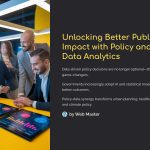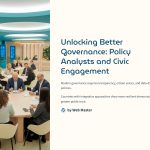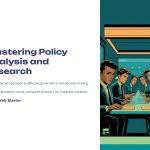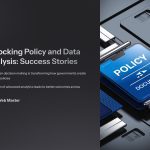 In today’s fast-changing world, policy analysis and research play a crucial role in shaping effective governance. As policies influence economies, societies, and global relations, a solid foundation in policy analysis is essential. This article delves into policy analysis methods, research approaches, and practical applications based on real-world scenarios. Whether you are a policymaker, researcher, or student, understanding these principles will empower you to create impactful solutions.
In today’s fast-changing world, policy analysis and research play a crucial role in shaping effective governance. As policies influence economies, societies, and global relations, a solid foundation in policy analysis is essential. This article delves into policy analysis methods, research approaches, and practical applications based on real-world scenarios. Whether you are a policymaker, researcher, or student, understanding these principles will empower you to create impactful solutions.

The Role of Policy Analysts in Decision-Making
Policy analysts are key players in designing and evaluating policies. Their role involves gathering data, assessing policy impacts, and providing recommendations. Effective policy analysts must balance economic, social, and political factors while considering stakeholder perspectives.
Key responsibilities include:
- Conducting cost-benefit analyses
- Identifying policy gaps and opportunities
- Forecasting long-term policy impacts
- Evaluating the effectiveness of current policies
- Recommending actionable solutions
Governments, NGOs, and private institutions rely on policy analysts to ensure decisions are evidence-based. Their work influences legislation, economic strategies, and social programs, making their role indispensable in governance.

Research Methodologies for Policy Analysis
Policy research utilizes various methodologies to ensure data-driven decision-making. The most common approaches include:
1. Qualitative Analysis
This method focuses on non-numerical data such as interviews, case studies, and expert opinions. It is useful for understanding public sentiments and the social impact of policies.
2. Quantitative Analysis
Quantitative research involves statistical techniques, surveys, and economic modeling. It helps in predicting policy outcomes and measuring effectiveness.
3. Mixed-Methods Approach
Combining qualitative and quantitative methods offers a comprehensive analysis, allowing researchers to validate findings and ensure balanced policy recommendations.
Applying these methodologies ensures that policy decisions are well-informed and adaptable to changing socio-economic conditions.

Real-World Applications of Policy Research
Policy research directly impacts various sectors, including:
- Healthcare Policies: Research-driven policies improve public health outcomes by optimizing resource allocation.
- Economic Strategies: Data-backed policies help in formulating taxation, trade, and investment strategies.
- Environmental Policies: Research supports sustainable policies addressing climate change and resource management.
- Education Policies: Evidence-based reforms enhance curriculum development and access to quality education.
By integrating research into policy development, decision-makers can enhance efficiency and public trust in governance.

Challenges in Policy Research and Analysis
Despite its significance, policy research faces several challenges:
- Data Limitations: Access to accurate and comprehensive data is often restricted.
- Political Influence: Policymakers may manipulate research findings to align with agendas.
- Implementation Barriers: Even well-researched policies face resistance from stakeholders.
- Resource Constraints: Conducting thorough research requires funding, expertise, and technology.
Addressing these challenges requires transparency, collaboration, and technological advancements in policy analysis.

The Future of Policy Analysis: Emerging Trends
The field of policy analysis is evolving with new technologies and innovative approaches:
- Big Data & AI: Machine learning models enhance predictive analytics in policymaking.
- Blockchain for Transparency: Decentralized data storage improves accountability.
- Crowdsourced Policy Research: Public engagement in research enhances policy acceptance.
- Sustainability & Climate Policy Innovations: Integrating green policies for long-term impact.
Staying ahead of these trends is crucial for effective policy research and implementation.

Conclusion: Strengthening Policy Analysis for Better Governance
Policy analysis and research are fundamental to informed decision-making. By leveraging data-driven methodologies, overcoming challenges, and embracing emerging trends, policymakers can create sustainable and impactful policies. Continuous learning and adaptation are key to addressing global challenges through policy research.
*Capturing unauthorized images is prohibited*







